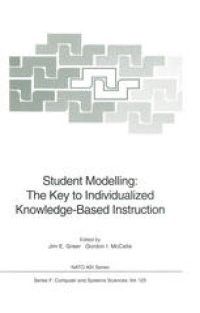
Ebook: Student Modelling: The Key to Individualized Knowledge-Based Instruction
Author: Peter Holt Shelli Dubs Marlene Jones Jim Greer (auth.) Jim E. Greer Gordon I. McCalla (eds.)
- Tags: Artificial Intelligence (incl. Robotics)
- Series: NATO ASI Series 125
- Year: 1994
- Publisher: Springer-Verlag Berlin Heidelberg
- Edition: 1
- Language: English
- pdf
This book is the result of a NATO sponsored workshop entitled "Student Modelling: The Key to Individualized Knowledge-Based Instruction" which was held May 4-8, 1991 at Ste. Adele, Quebec, Canada. The workshop was co-directed by Gordon McCalla and Jim Greer of the ARIES Laboratory at the University of Saskatchewan. The workshop focused on the problem of student modelling in intelligent tutoring systems. An intelligent tutoring system (ITS) is a computer program that is aimed at providing knowledgeable, individualized instruction in a one-on-one interaction with a learner. In order to individualize this interaction, the ITS must keep track of many aspects of the leamer: how much and what he or she has leamed to date; what leaming styles seem to be successful for the student and what seem to be less successful; what deeper mental models the student may have; motivational and affective dimensions impacting the leamer; and so ono Student modelling is the problem of keeping track of alI of these aspects of a leamer's leaming.
This volume in the NATO Advanced Educational Technology program gives a comprehensive overview of the field of student modelling. Student modelling,a special case of user modelling, gives an intelligent tutoring system the capability to individualize its interactions with a student. The book collects together contributions from many of the world's leading authorities on student modelling. They include formalists, knowledge engineers, and cognitive scientists, to give the book an interdisciplinary flavour that enriches the treatment. The editors have written an overallintroduction that helps to integrate the many ideas in the book. This is a unique, comprehensive, and up-to-date treatment of the field.
This volume in the NATO Advanced Educational Technology program gives a comprehensive overview of the field of student modelling. Student modelling,a special case of user modelling, gives an intelligent tutoring system the capability to individualize its interactions with a student. The book collects together contributions from many of the world's leading authorities on student modelling. They include formalists, knowledge engineers, and cognitive scientists, to give the book an interdisciplinary flavour that enriches the treatment. The editors have written an overallintroduction that helps to integrate the many ideas in the book. This is a unique, comprehensive, and up-to-date treatment of the field.
Content:
Front Matter....Pages I-X
Front Matter....Pages 1-1
The State of Student Modelling....Pages 3-35
Front Matter....Pages 37-37
Granularity-Based Reasoning and Belief Revision in Student Models....Pages 39-62
Student Modelling Through Qualitative Reasoning....Pages 63-97
Modeling the Student in Sherlock II....Pages 99-125
Using Machine Learning to Advise a Student Model....Pages 127-146
Building a Student Model for an Intelligent Tutoring System....Pages 147-163
Front Matter....Pages 165-165
Constraint-Based Student Modeling....Pages 167-189
Strengthening the Novice-Expert Shift Using the Self-Explanation Effect....Pages 191-210
Diagnosing and Evaluating the Acquisition Process of Problem Solving Schemata in the Domain of Functional Programming....Pages 211-264
Front Matter....Pages 265-265
Modelling a Student’s Inconsistent Beliefs and Attention....Pages 267-280
A Formal Approach To ILEs....Pages 281-294
Formal Approaches to Student Modelling....Pages 295-352
Front Matter....Pages 353-353
Re-Writing Cartesian Student Models....Pages 355-376
Back Matter....Pages 377-390
This volume in the NATO Advanced Educational Technology program gives a comprehensive overview of the field of student modelling. Student modelling,a special case of user modelling, gives an intelligent tutoring system the capability to individualize its interactions with a student. The book collects together contributions from many of the world's leading authorities on student modelling. They include formalists, knowledge engineers, and cognitive scientists, to give the book an interdisciplinary flavour that enriches the treatment. The editors have written an overallintroduction that helps to integrate the many ideas in the book. This is a unique, comprehensive, and up-to-date treatment of the field.
Content:
Front Matter....Pages I-X
Front Matter....Pages 1-1
The State of Student Modelling....Pages 3-35
Front Matter....Pages 37-37
Granularity-Based Reasoning and Belief Revision in Student Models....Pages 39-62
Student Modelling Through Qualitative Reasoning....Pages 63-97
Modeling the Student in Sherlock II....Pages 99-125
Using Machine Learning to Advise a Student Model....Pages 127-146
Building a Student Model for an Intelligent Tutoring System....Pages 147-163
Front Matter....Pages 165-165
Constraint-Based Student Modeling....Pages 167-189
Strengthening the Novice-Expert Shift Using the Self-Explanation Effect....Pages 191-210
Diagnosing and Evaluating the Acquisition Process of Problem Solving Schemata in the Domain of Functional Programming....Pages 211-264
Front Matter....Pages 265-265
Modelling a Student’s Inconsistent Beliefs and Attention....Pages 267-280
A Formal Approach To ILEs....Pages 281-294
Formal Approaches to Student Modelling....Pages 295-352
Front Matter....Pages 353-353
Re-Writing Cartesian Student Models....Pages 355-376
Back Matter....Pages 377-390
....